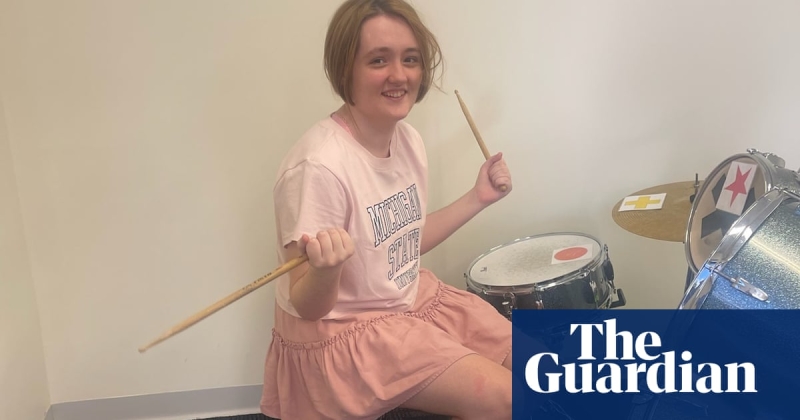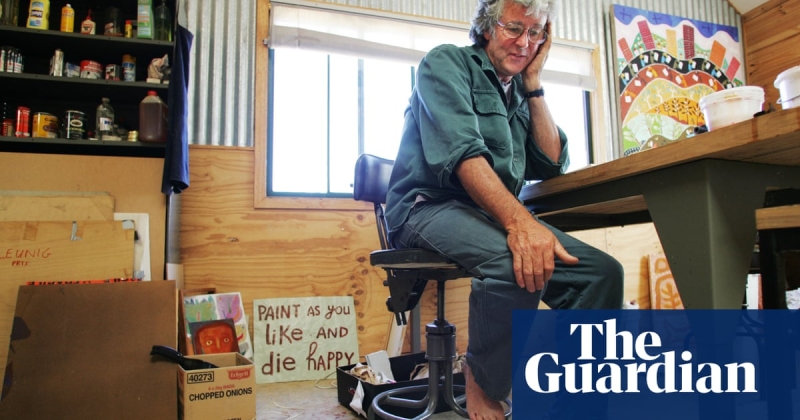Nineteen-year-old communicates with her friends and family through music – but a government policy change is threatening that vital human connection
Ava Rinna communicates with friends and family through music but her weekly sessions could be cut if a review finds her therapy is not suitable for NDIS funding.
The 19-year-old from the Gold Coast has been diagnosed with autism level 3 and is mostly non-verbal, apart from communicating through songs.
Ava’s mother, Julia, told Guardian Australia a speech pathologist recommended Ava try music therapy five years ago after noticing she was always singing.
“Ava just lit up when music came around, like it inspired her,” Julia said. “It made her happy. It gave her emotion, because she couldn’t communicate.”
There was an instant improvement in how Ava could communicate, her mother said. Through jingles and songs, Julia said Ava developed her vocabulary to express her thoughts and emotions.
“The music in our house is a necessity for her.
“I’ve gone into her world of talking and communicating in a way that she understands.”
But the future of music and arts therapy is under threat, professionals in the industry have warned.
The National Disability Insurance Agency, which runs the multibillion-dollar scheme announced in November that creative arts-based therapies would no longer be listed as a therapy support.
The decision, which has been deferred pending an independent review, would cap one-to-one sessions at $67.56 an hour, down from $193.99.
The NDIA said the review, expected to be delivered in March, will look at evidence of the therapy’s effectiveness and the required qualifications and registrations of providers.
It will also assess pricing.
The NDIS minister, Bill Shorten, defended the initial decision as necessary to determine quality control of the therapy sessions being offered.
“I’m sure it may be helping some kids but a lot of other people can’t afford it in their packages,” Shorten said.
“I actually see that there’ll be more access to music and art on the scheme because more people will be able to afford $68 … an hour to pay someone than $193. I’ll be guided by the evidence. I’m going to leave it to the experts.”
But those working in the field have said they are frustrated by a lack of initial consultation and the “reputational damage”” caused to the industry by the announcement.
Monica Zidar, the president of the Australian Music Therapy Association, said many in the industry were disappointed that it took an appeal to the minister to have the decision reconsidered.
“We are masters-qualified university graduates, and we study for a minimum of five years at university to be qualified, and we are regulated by NASRHP [National Alliance of Self Regulating Health Professions],” she said. “So, we’re a fully regulated allied health profession by definition.”
“The way that this has been handled has caused a great deal of reputational damage.”
Zidar said jobs could be cut if a price cap were imposed and it would result in people like Ava losing access to regular sessions.
Under the NDIA’s proposed changes, participants could still use music and arts therapy but it would be relegated to a community participation budget.
A one-to-one session would have a maximum rate of $67.56 an hour while group sessions, with at least four participants, would have a maximum rate of $193.99 an hour shared between the participants involved.
Grace Thompson, a music therapist and senior academic at the University of Melbourne, said music therapy worked across three domains: cognitive, motor and emotional.
Thompson said it helped non-verbal participants to communicate through music in a form of protoconversation.
“It’s often quite difficult for speech pathologists to achieve that kind of response from people,” she said.
After a course of music therapy, Thompson said people often progressed to more detailed speech and language therapy.
Thompson said if the changes went ahead, participants with the most complex needs would be hit the hardest.
Julia said she still felt emotional about Ava’s communication challenges but music therapy had been a saving grace.
“A couple of weeks ago she actually looked at me in the morning and said, ‘Sore ear.’ She’s learning, and it makes me so happy that she can actually talk and tell me.
“She’s not a person of many words but she’s learning, and I would be devastated – it would really deflate our world – if it got taken away. It’s the only thing that makes her happy.”





